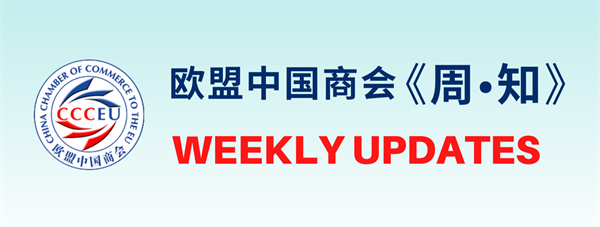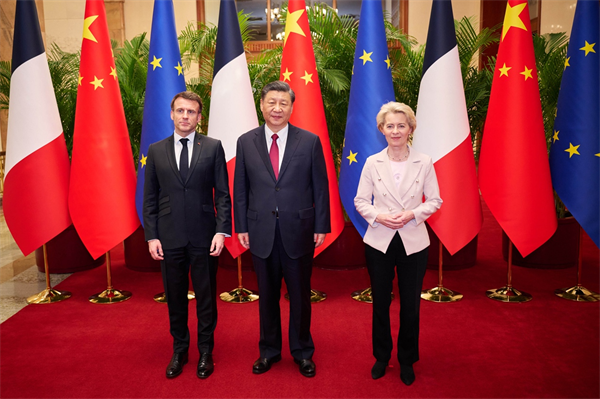Elements of Business in President Macron and von der Leyen's Joint Visit to China


Editor's Note: The highlight of China-EU relations this week is undoubtedly the joint visit to China of French President Macron and European Commission President von der Leyen. Elements of business have been interspersed in the schedule. As always, our CCCEU Weekly Update is here to keep you informed about the latest developments in China-EU relations. Happy Easter to European readers! Enjoy your reading and have a lovely weekend!
A Delegation Consisted of Entrepreneurs
It is worth noting that Macron has been joined on the trip by the heads of the biggest French companies, including aircraft manufacturer Airbus, high-speed rail manufacturer ALSTOM, energy giant EDF, cosmetics giant L'Oréal, etc.
During his visit, a series of significant cooperation agreements have been signed, covering traditional cooperation fields such as agriculture and food, aerospace, and civil nuclear energy, as well as new growth points such as green development and technological innovation. Macron will also visit Guangdong, a predominant manufacturing province, and meet with Chinese investors.
In addition, von der Leyen also met with President Wuttke of the European Union Chamber of Commerce in China and representatives of EU entrepreneurs in China. Recalling German Chancellor Scholz's visit to China in November last year, he also brought a leading business group composed of entrepreneurs from BMW, Volkswagen, Siemens, and Adidas.
All above reflect the prosperity of economic and trade cooperation between China and Europe. During the meeting, China and France emphasized the need to adhere to the stable, mutually beneficial, pioneering, and upward overall direction of the comprehensive strategic partnership.
De-risking vs. Decoupling
Faced with the argument of EU-China decoupling, von der Leyen clarified that the EU can independently decide its policy towards China, and decoupling is neither the focus nor a strategic choice. But she also mentioned that de-risking remains an important concern for the EU, following the views in her latest speech on EU-China relations released in Brussels.
During the closing ceremony of the fifth meeting of the China-France Entrepreneur Committee in Beijing, Macron also stated that France opposes decoupling and hopes to create a more stable and open supply chain.
The Business Environment
The business environment has been the main focus of enterprises. In the trilateral meeting, President Xi pointed out that China and Europe share broad common interests, with cooperation surpassing competition and consensus surpassing differences. Chinese modernization and European integration are strategic choices made by both sides with a view to the future. China and Europe should maintain two-way openness, provide a fair and non-discriminatory business environment for each other's enterprises, and avoid politicizing and securing economic and trade issues. The two sides should build a stable and mutual-trust supply chain, link the Belt and Road initiative with the EU's Global Gateway strategy, and help both sides achieve long-term and stable economic growth.
To Restart High-level Dialogues
This year marks the 20th anniversary of the establishment of a comprehensive strategic partnership between China and the EU. In addition to the "serious imbalance" in economic relations, von der Leyen also stated that close cooperation between China and the EU is expected in the most urgent global challenges such as climate change, nuclear threats, global health, and global financial stability. She proposed to restart the high-level strategic dialogue, high-level economic and trade dialogue, and high-level cultural exchange dialogue mechanisms between the EU and China as soon as possible.
The Ukrainian Crisis
On the issue of Ukraine, von der Leyen put forward on March 30 that "how China continues to interact with Russia will be a determining factor for EU-China relations going forward". At this trilateral meeting, China pointed out that "the Ukrainian crisis is not a problem between China and Europe", and promoting peace and negotiations remains China's attitude. China will continue to play a positive role in promoting peace and negotiations, and support the EU in proposing political solutions to the Ukrainian crisis from its own fundamental and long-term interests, and promote the construction of a balanced, effective, and sustainable European security framework. China also issued a joint call with France for a political solution to the Ukrainian crisis. Von der Leyen and Macron understood that China is not the maker of the Ukrainian crisis, and appreciated China's efforts in the Ukrainian crisis.
Partners Rather than Rivals
Economic and trade cooperation has always been the cornerstone of China-Europe relations. Although China and Europe have made respective efforts in the fields of the digital economy and green economy in recent years, business exchanges and trade exchanges have faced negative impacts due to the pandemic. In the post-pandemic era, the demand for bilateral trade and investment is expected to be further released. China is an important partner for Europe to solve energy, inflation and other challenges and improve its competitiveness.
EU-China Cooperation as the Impetus of the World:
With the continuous deepening of China's opening up to the world and the continuous improvement of the investment environment, European enterprises seeking development opportunities in the Chinese market come from both enterprises which have been continuously benefiting from the Chinese market for many years, and those who are optimistic about the prospects of the Chinese economy and market and are willing to explore the future. As Ambassador Fu Cong mentioned in a recent interview with the Financial Times, the enthusiasm of the European business community for investing in China is encouraging. Especially against the backdrop of weak global economic recovery and changing geopolitical landscape, the mutually beneficial and prosperous development of economic and trade cooperation between the two major markets - China and Europe, will inject new impetus into the world. In the future, we look forward to Chinese and European enterprises seizing the opportunity to fully activate dialogue and cooperation in various fields, and further enhancing the resilience and vitality of bilateral economic and trade cooperation.
Key Takeaways of Euro Summit Conclusion
On 23 March 2023, the European Council adopted conclusions on Ukraine, the single market and the economy, energy, and other items.
(i) Economic and fiscal situation. The statement said that despite high inflation and energy prices, the Eurozone economy is on a healthier footing in early 2023 than previously expected. The euro area will continue to closely coordinate economic policies and enhance economic resilience, and needs to continue to closely monitor economic developments. (ii) The economic governance framework is a key pillar of the economic and monetary union architecture, supporting the stability of the euro and the resilience of the euro area economy. (iii) A strong European financial architecture helps to attract sustained investment, support innovation and job creation, and fast-track the green and digital transition. First, further development of capital markets can help improve the macroeconomic management of the economy and monetary union. The conference called on EU national policymakers and market participants to work together to advance the Capital Markets Union. Second, the banking union has greatly enhanced the resilience of the EU banking system. The statement said the euro area banking sector is resilient and in good capital and liquidity position. The meeting called for continued efforts to build the Banking Union.
Global trade growth to slow to 1.7 percent in 2023: WTO report
According to Xinhua, global trade growth in 2023 will slow to 1.7 percent, the World Trade Organization (WTO) said in its annual trade statistics and outlook report, published on Wednesday.
The volume of world merchandise trade has been weighed down by the effects of the conflict in Ukraine, high inflation, tighter monetary policy and financial market uncertainty, the report said.
However, the forecast for trade growth in 2023 is up from the previous estimate of 1.0 percent from last October. China's adjustment of its COVID-19 measures is a "key factor" in this increase, the report said. The reopening of China is expected to boost international trade, the report said.
PRC Economy Forecast to Grow 5% as Household Demand Recovers
According to ADB, economic growth in the People's Republic of China (PRC) is expected to increase to 5% in 2023 following the lifting of COVID-19 restrictions and the recovery of household demand, according to the Asian Development Outlook (ADO) April 2023, released today by the Asian Development Bank (ADB).
Consumer demand is expected to pick up after the lifting of COVID-19 restrictions at the end of 2022. However, the recovery may take time, given the reluctance of households to spend over the past 3 years amid pandemic-related uncertainty.
"Fiscal spending, like infrastructure investment, will continue to be needed in the short run to catalyze economic recovery, in particular since external demand may ease in 2023 as growth in advanced economies cools," said ADB Country Director for the PRC Safdar Parvez.
The UK to introduce new customs rules on EU goods from November
According to Euractiv, after more than two years of post-Brexit delays, the UK has promised to introduce a light-touch set of customs rules on goods from the EU later this year.
In a proposal published on Wednesday (5 April), the UK government said that the new regime would introduce a trusted traders' scheme known as the UK Single Trade Window – a single digital gateway to reduce bureaucratic requirements for regular importers and exporters.
The new import controls will come into force in three phases between November 2023 and November 2024.
What are experts talking about?
The first article in this issue is "Technology Neutrality, Preference and Bias in the EU's Choice of Energy Transition Path", written by Dongfang Zhang. The article mentions that Germany argues that zero-carbon vehicles should remain open to all carbon-neutral technologies on the grounds of "technological openness", rather than simply imposing a ban on internal combustion engines.
"What's behind the European rush to rekindle ties with China?" by Jonathan Eyal. The article argues that Beijing is seen as playing a key role in defusing the conflict in Ukraine as it continues to evolve. Chinese President Xi Jinping's recent trip to Moscow had an important practical result: it prompted European leaders to come forward with plans to visit Beijing, all eager to hear what China is prepared to do to mediate the conflict. While the Americans talk about "decoupling" and want to free their economies from dependence on China, von der Leyen prefers to talk about "risk reduction. It is clearly more acceptable for Russia to let China assume the role of peacemaker. So Beijing is in a unique position to establish itself as a leading player in this arena.
Please note: the English version of this issue is slightly different from our Chinese one. The views and opinions expressed in this article do not necessarily reflect the official position of the CCCEU.

 Login
Login Login
Login CCCEU and Gunnercooke Successfully Host Webinar on CSDDD and FLR Compliance to Guide Chinese Businesses
CCCEU and Gunnercooke Successfully Host Webinar on CSDDD and FLR Compliance to Guide Chinese Businesses Cultivating responsible China-EU business leaders essential to tackling global challenges
Cultivating responsible China-EU business leaders essential to tackling global challenges



